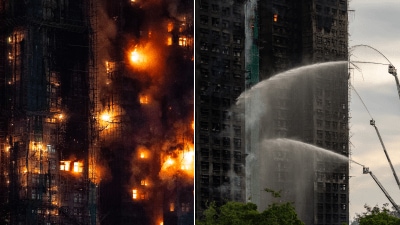Staff crunch, venue delay: Kochi Biennale scrambles to get its act together
While the organisers cited “organisational challenges, compounded by external factors” for the last-minute postponement, several participants feel the announcement could have been made earlier.
 Glimpses from ‘Where Do We Stand Now?’ -- a performance and live art programme curated by HH Art Spaces and Nikhil Chopra at the Dutch Warehouse. (Facebook/ Kochi-Muziris Biennale)
Glimpses from ‘Where Do We Stand Now?’ -- a performance and live art programme curated by HH Art Spaces and Nikhil Chopra at the Dutch Warehouse. (Facebook/ Kochi-Muziris Biennale) AFTER THE Kochi-Muziris Biennale was postponed hours before it was to open for the public on December 12, it was not just visitors who were distressed but also participating artists.
While the organisers cited “organisational challenges, compounded by external factors” for the last-minute postponement — from a delay in gaining access to the main venue to shortage of staff — several participants feel the announcement could have been made earlier.
“I was really excited to show my work and interact with viewers but it won’t be possible to be here so close to Christmas, as it now opens on December 23,” said French artist Massinissa Selmani. Like some other participants, he did not attend the inaugural ceremony attended by Chief Minister of Kerala Pinarayi Vijayan on December 12. “Why should we go? The biennale hasn’t opened,” Selmani asks.
 The 10th anniversary of Kochi-Muziris Biennale was inaugurated by Pinarayi Vijayan, others. (Image source: Instagram/@kochibiennale)
The 10th anniversary of Kochi-Muziris Biennale was inaugurated by Pinarayi Vijayan, others. (Image source: Instagram/@kochibiennale)
Scheduled to take place in 2020, this edition of the biennale was postponed twice due to the pandemic. This time, the satellite exhibitions, invitation projects and Students’ Biennale have opened, but the main biennale venues — Aspinwall House, Pepper House and Anand Warehouse — will open together later.
“What has happened is terrible and is an organisational responsibility, it was not the fault of the curator,” says Bose Krishnamachari, president of Kochi Biennale Foundation. He adds that till it started raining over the weekend, the organisers believed that most of the works would be up by December 12.
“We have been wanting to start work for months but there was a huge delay in getting the main venue, Aspinwall House. The Kerala government has been negotiating to acquire it from DLF, which owns a part of it, and those talks were going on. We finally got the venue on November 4, but only partial access initially… a lot of repair work could not be done or rooms prepared, and the works could not be installed. When it rained and we realised that there were leaks, we had to push it back by 10 days as we felt that was a realistic date to open as fully as possible,” says Krishnamachari.
Delhi-based Asim Waqif, whose installation “Improvise” is one of the outdoor projects at Aspinwall House, describes working for this biennale as one of his most “frustrating” experiences. “I could anticipate three-four months back that there were going to be serious problems,” he says.
Waqif recalls how he had approached the biennale team for assistance for ground research for his installation that uses bamboo, coir and pandanus leaves, and was informed there was a staff shortage. “Everything has been delayed, from my on-site visit earlier this year, to the time when bamboo arrived in Fort Kochi for me to start work. I am yet to sign a contract with the biennale and haven’t received my artist fee,” he says.
According to Krishnamachari, organisational changes were also made in recent months, and new trustees appointed closer to the opening date. Several problems of the biennale are also tied to its financial troubles.
“The funds during this edition are better than other years. We have government funding, private patrons and sponsors but the total funds garnered aren’t sufficient and we hope tickets sales and a charity auction may help further. Also, the funds need to come on time… The biennale can’t accept foreign funding either, we don’t have FCRA (clearance),” he says.
On site, some of the artists say they are still waiting for their shipments to arrive. The delays have been caused due to “late action, changes in customs-related policies and longer and more expensive process for bank guarantees”, says Krishnamachari. The shipment costs have also gone up post pandemic, he says.
Some of the participants also raised concerns over delayed payments to daily wage labourers who worked for the 2018-19 edition. “We have been assured by the biennale that the issue has been resolved,” says French artist Nathalie Muchamad.







